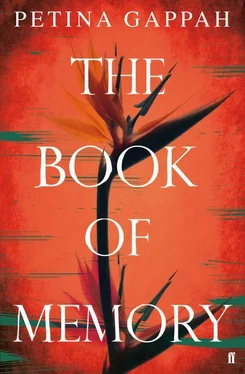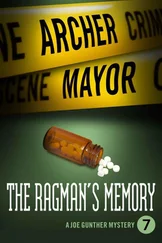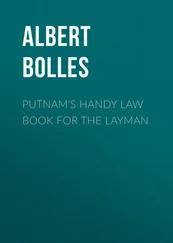On the day that I left home, Lloyd met my parents and me at the Post Office. I did not look directly at him, but glanced from the side so that I saw him only in glimpses that I then assembled in my mind.
I sat rigid without moving. I did not look at the city streaming past the windows. I had no curiosity about where we were going. I sat stiff with my hands under my knees. I kept my eyes fixed on the little doll that hung from his driver mirror and swung to and fro as he drove. I focused on its pink hair and half-naked body and grinning face.
He saw me look at it, and unhooked it. ‘It is a troll,’ he said. ‘It was a birthday present from my sister. You can have it.’ He placed it in my lap. ‘You can keep it,’ he added.
I did not pick it up, but let it sit on my lap where it moved with the car. When we stopped at the traffic lights, it fell to the floor. I bent to pick it up and clutched it. I was still clutching it as we walked up to the Wimpy at the Union Arcade, next to Brentoni’s.
I looked for that Wimpy when I came back, but like other places that I knew, it has been erased from the face of the city. There is another Wimpy now, further along the same road, but on the other side of First Street.
If people stared at our odd pairing, I did not notice it. I kept my eyes focused on the little troll doll. Lloyd ordered a plate of chips and a strawberry milkshake. I looked at the doll and wondered how something as ugly as that could be so comforting.
When he talked, he mixed Shona and English. His zva sounds came out like zha and it made him sound like a small child, like Mobhi. That made me less afraid of him. I watched his mouth move as he ate my untouched chips. He took out a packet of cigarettes. It was this that finally broke me down. They were Everest — the coolest taste in smoking, said the packet; they were the same cigarettes that my father smoked as he whistled to the radio. As the smoke swirled around our table, I finally gave in to the tears I had been holding back.
The smoke floated around us in that Wimpy, he watched me cry, and I could not stop it. I held the troll doll to my face and soaked its pink hair with my tears. He ordered an ice cream sundae that sat and melted until the little coloured grains that were sprinkled on it, which I later learned were called hundreds and thousands, disappeared into little coloured blobs in the milky mess.
When Lloyd registered me at the Dominican Convent, I knew that my sale was final. He needed my birth certificate, you see. He needed it to register me.
I had last seen my birth certificate at our house in Mufakose when my father registered my brother and sister and me at our new primary school in Mufakose. My father had then returned the certificates to the Manila envelope inside the briefcase that he kept locked on top of the wardrobe in my parents’ bedroom. The birth certificates were usually in protective plastic folders together with Gift’s, and later Mobhi’s, death certificates.
So when I saw my birth certificate on Lloyd’s desk together with an application form for the Convent, on which he had put his unreadable scrawl in the space above the words ‘Signature of Parent or Guardian’, I knew that only my mother or father could have given it to Lloyd.
It was the final confirmation that my sale was irrevocable. It was then that I knew there was nothing at all that I could do about it; and there was no one that I could tell. Who could I have turned to? I was nine years old. I was alone. The people who could have helped me were the people who had sold me in the first place. I did not know how to get back home; I did not even know in which direction home was.
The pain was made bearable only by the thought that, if my mother and father could get rid of me so easily, I did not want to be with them. If they could do without me, I resolved, then I could just as well do without them.
This was a vow that was better made than kept.
In that first year, it seemed to me that I saw them everywhere I looked. My heart grew still when I saw any tall, straight man with a short, neat Afro. Six months after I left home, Lloyd dropped me off at the Queen Victoria Memorial Library on Rotten Row; I saw a man that I knew was my father. So certain was I that it was him that I ran after him across the street. The traffic lights changed before I noticed them and all around me car horns beeped, and I came to myself.
An irate driver who had almost run me over got out of his car and blocked my path. More horns beeped around us as he made a grab for me, but I managed to slip away. I ran all the way back to the library without stopping, and I lost sight of my father, or the man that I had imagined to be my father.
The phantom sightings continued over the years. One Sunday, two years after my sale, at the racecourse at Borrowdale with Lloyd and Liz Warrender, I heard a woman shout ‘ Iwe , Moreblessings!’ Even as I knew that it could not be our Moreblessings because our Mobhi was dead, and even as I saw that this Moreblessings was not a girl but a woman in a bright pink shirt and a yellow banana clip in her hair, my hope still rose in my throat until it stung my eyes.
That day, and on every day that I went to the racecourse, I imagined my father sitting at his wireless set in our house on Mharapara Street in Mufakose, listening to the invisible thunder of the horses that I saw before me.
Throughout the years, I would catch what I thought were glimpses of one or another of my family, but as the years ran into each other, the memories faded.
Years later, when I had begun to think of Lloyd and Poppy as my family and Summer Madness as my home, at St Dominic’s Secondary School in Chishawasha, the valley opposite Umwinsidale, I saw a schoolgirl, small, slight and caramel-skinned, who might have been my sister Joy.
St Dominic’s was the rural version of our school. It was not so much a sister school; more like a cousin, a poor rural one for that matter, where the girls were not considered sophisticated enough for the blazers, boaters, French, swimming or tennis that was considered so necessary for us.
We had gone there for a debate; something about colonialism bringing more harm than good. After the motion was carried, we got into our bus to leave. As our bus negotiated its way along the narrow path that led to the school gate, we stopped to make room for their school bus.
As their bus passed us, I saw among the faces in the bus a girl who could have been my sister, a girl who could have been the child that my sister Joy had been when I last saw her. As though sensing that I was staring at her, she turned in my direction. Our eyes met. In that moment, our bus drove away, and I was left to persuade myself that I had imagined the resemblance.
I never saw them again. Even after I was old enough to have my own money and I could navigate the city on my own, even after I turned sixteen and Lloyd gave me my beloved orange Beetle, I did not look for them. By this time, I had reasoned to myself once and for all that if they did not want me, I did not want them either. Most of all, I did not look for them because I was afraid that seeing them would only confirm my loss.
I wondered often why Lloyd had taken me in. You see how insidious his influence is, how I am using his language. I believe he came close to explaining, after all the ugliness with Zenzo, but I did not open the letter he put under my door. I did not want to hear his self-justification.
In the years that followed, my feelings for Lloyd went through a complex spectrum that took in fear, affection, anger and revulsion, gratitude and, ultimately, pity. If you had met Lloyd, you would have been struck that such a mild and gentle man could cause feelings of such depth and intensity.
Читать дальше












